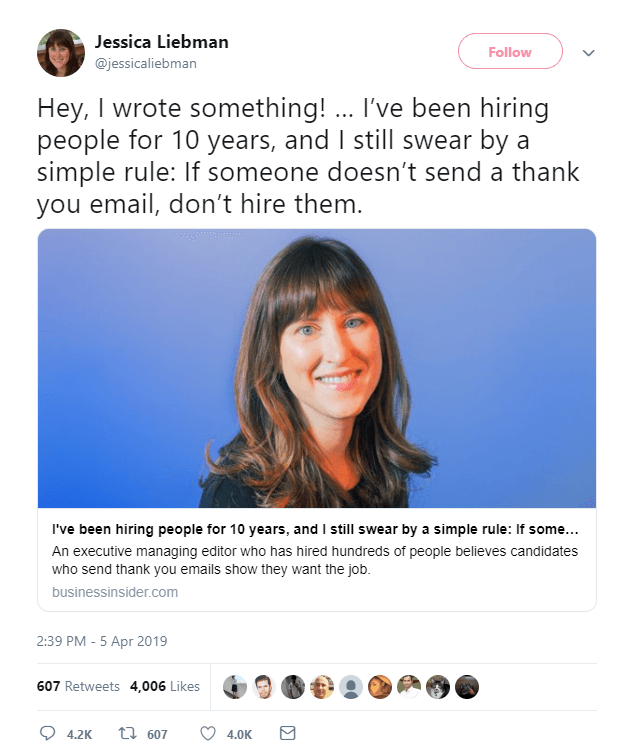If you’re on Twitter, you might have seen this tweet blow up this week:

Jessica Liebman tweeted: ‘I’ve been hiring people for 10 years, and I still swear by a simple rule: If someone doesn’t send a thank you email, don’t hire them’ and a link to an article she wrote explaining why.
The reaction on Twitter, as it went viral, was mixed to say the least. Some claimed this attitude is elitist and discriminatory, and it reflects badly on the company/industry’s culture. While others agreed that a follow-up ‘thank you’ email was a indication of a candidate’s enthusiasm for the role, and should be taken into consideration.
We asked our team of careers advisers what they think: should you send a follow-up ‘thank you’ email after an interview? Here’s what they had to say:
Claire Roethenbaugh, Careers Adviser:
“This is an interesting one and my gut feeling would be ‘it depends’! I don’t know what the right answer is but I wouldn’t advise students to always do this – but rather to read the situation and the vibes throughout the interview process.
I think an employer could be missing a trick by blanket not hiring those who don’t do this. There might be very good reason the candidate has chosen not to. e.g. they know the employer is very busy, they don’t want to come across as sycophantic, they don’t want to appear too desperate in case they want to negotiate a better salary for example, they respect that the employer has processes to follow.”
Lauren Cole, Careers Support Officer:
“I think articles like this are really unhelpful in perpetuating the idea that students have to jump through a bunch of arbitrary hoops to get a job they want. But also, it’s a good reminder that when you get a ‘no’ from an organisation perhaps you’re not a good fit and ultimately wouldn’t enjoy the workplace. If the idea of having to send a thank you message feels arbitrary and a bit elitist to you (as it does to me), then you definitely wouldn’t want to work in close proximity with these people! Company culture is really important in ensuring you enjoy your post-graduation life.”
Clare Matthews, Careers Adviser:
“I think a ‘thank you’ can be a helpful follow-up strategy in the right circumstances. I wouldn’t say it’s always a must.
Pros:
- It’s nicer to receive/write than an ‘I haven’t heard from you yet’ follow-up email; if you’re a ‘maybe’ and they haven’t confirmed the post yet, it might help to confirm positive impressions from interview.
- It can help to maintain a good relationship if you are hoping for more informal opportunities from this contact or company in the future.
- In some industries, being able to follow-up contacts in a timely and friendly manner is an important part of the role – e.g. freelance work, some sales roles – so it gives you another chance to show you’d be good at the job.
Cons:
- It might not have desired effect in companies where there is a more impersonal approach to recruitment e.g. some large companies.
- It could feel like an additional burden of emails in a very small company if everyone interviewed sends a follow-up email.
- It could seem pressurising if you seem like you are pushing for an interview result outside of their timelines.
So, it’s not a must for all industries, and I’d also personally be wary of a culture that makes it seem so, but often helpful especially if this is a company you felt a good fit with and with whom you would like to pursue opportunities in the future.”
Jim Reali, Graduate Careers Consultant:
Note: The following from Jim is based on interpreting the query as a follow up email to a job offer, but the advice is still useful.
“I think that courtesy and a sense of professionalism are crucial. It’s a buyer’s market: employers can choose from many candidates – they don’t have to offer you a role. If they do, then you need to show that you will be a great ambassador for them and that you appreciate the value of them entrusting their opportunity to you.
If you can’t be bothered to thank them, then why should they be bothered to take you on? This can be particularly important when applying to an SME, where customer relationships are built on trust and professionalism, and the company can suffer if this breaks down. It also goes down to a deeper level: feedback loops and closed loop communications are crucial to the effective operation of organisations on a day-to-day basis.”
In summary, our advice is to read the situation and to use your initiative. If you’re going to send an email, make sure it’s personalised, timely, and polite. Jessica has written a piece in response to critics of her tweet, which clarifies her stance.
If you would like to discuss an application or to get help with an interview, you can make an appointment with a member of our careers advice team. Come in and see us at the Careers Service at 5 Tyndall Avenue, or make an appointment via mycareer.
